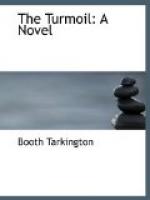This was the fringe of Bigness’s own sanctuary, and now Bibbs reached the roaring holy of holies itself. The car must stop at every crossing while the dark-garbed crowds, enveloped in maelstroms of dust, hurried before it. Magnificent new buildings, already dingy, loomed hundreds of feet above him; newer ones, more magnificent, were rising beside them, rising higher; old buildings were coming down; middle-aged buildings were coming down; the streets were laid open to their entrails and men worked underground between palisades, and overhead in metal cobwebs like spiders in the sky. Trolley-cars and long interurban cars, built to split the wind like torpedo-boats, clanged and shrieked their way round swarming corners; motor-cars of every kind and shape known to man babbled frightful warnings and frantic demands; hospital ambulances clamored wildly for passage; steam-whistles signaled the swinging of titanic tentacle and claw; riveters rattled like machine-guns; the ground shook to the thunder of gigantic trucks; and the conglomerate sound of it all was the sound of earthquake playing accompaniments for battle and sudden death. On one of the new steel buildings no work was being done that afternoon. The building had killed a man in the morning—and the steel-workers always stop for the day when that “happens.”
And in the hurrying crowds, swirling and sifting through the brobdingnagian camp of iron and steel, one saw the camp-followers and the pagan women—there would be work to-day and dancing to-night. For the Puritan’s dry voice is but the crackling of a leaf underfoot in the rush and roar of the coming of the new Egypt.
Bibbs was on time. He knew it must be “to the minute” or his father would consider it an outrage; and the big chronometer in Sheridan’s office marked four precisely when Bibbs walked in. Coincidentally with his entrance five people who had been at work in the office, under Sheridan’s direction, walked out. They departed upon no visible or audible suggestion, and with a promptness that seemed ominous to the new-comer. As the massive door clicked softly behind the elderly stenographer, the last of the procession, Bibbs had a feeling that they all understood that he was a failure as a great man’s son, a disappointment, the “queer one” of the family, and that he had been summoned to judgment—a well-founded impression, for that was exactly what they understood.
“Sit down,” said Sheridan.
It is frequently an advantage for deans, school-masters, and worried fathers to place delinquents in the sitting-posture. Bibbs sat.
Sheridan, standing, gazed enigmatically upon his son for a period of silence, then walked slowly to a window and stood looking out of it, his big hands, loosely hooked together by the thumbs, behind his back. They were soiled, as were all other hands down-town, except such as might be still damp from a basin.
“Well, Bibbs,” he said at last, not altering his attitude, “do you know what I’m goin’ to do with you?”




